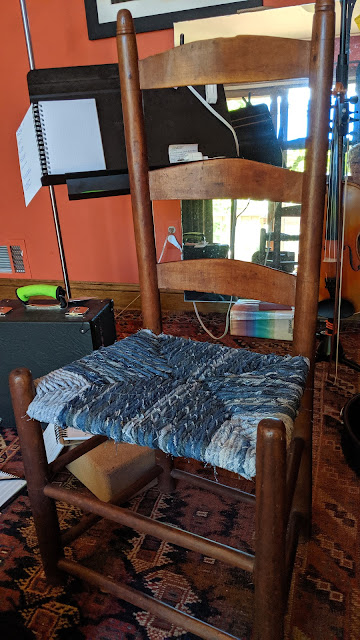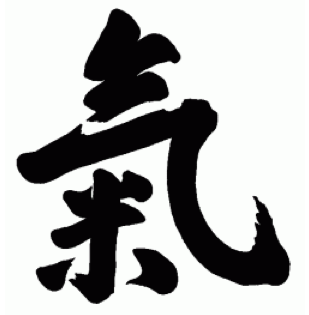From Connection - to Detatchment - to Connection
A Zen writer once addressed the criticism that Zen Buddhists are too focused on being detached. A student asked: "Isn't Zen all about being 'one with everything'? So why are Zennies always talking about staying detached?"
The author responded that there was a progression in which the student at first has an unhealthy connection to their emotions and sensations, and has to learn to detach from this connection. But that eventually the student comes back to truly comprehending the unity of everything.
It sounded like a bunch of gobbledygook to me.
The other day my piano teacher started to talk about those moments in playing when you lose your ego, and it's "as if the music is playing you." I got a little glimmer of what he was talking about, and I even saw the relationship to the idea of being connected vs. being detached.
So, let's see if I can explain it in a way that even I can understand.
Connection
Most people are used to letting their sensations and emotions pretty much "run the show": ruling their lives, dictating their actions, reactions, their mood and even their sense of who they are. If I get mad at someone, or am feeling bad about myself, it can color the rest of my day, week, even year. Some of us become so attached to these emotions and sensations that we seek them out almost as if we are addicted. When we're not experiencing them, we daydream about them to the extent that we're seldom even "present" in our own lives. That's the unhealthy part of connection.
Detachment
The first part of a Buddhist practice is often to learn to notice when our thoughts are carrying us away from what's going on in the present moment. This is usually done as a meditation practice, but that's not the only way. This process can be referred to as "detachment," but it's more a detachment from the constant internal commentary about what's going on, than a detachment of "me" from "the world." Still, it seems like you're detaching yourself from the world, because you're so used to associating your self with all these thoughts about stuff. As you get more accustomed to detachment, it "leaks" into daily life, so that you are able to feel like you are less ruled by your emotions and desire for pleasurable sensations, and have more independence and ability to act.
Return to Connection
After a bunch of time at this practice of "detachment," (so the theory goes,) you end up interacting with the world around you in a way that is not so mediated by internal commentary or desires. That is to say, you interact with the world more directly. So it's kind of a paradox: that you practice detaching what's actually happening, from your reactions to what's happening - and you end up becoming more connected to what's happening, and being "one with everything"!
As for getting to the point where you lose your ego and "the music is playing you"...well, I have an intellectual understanding, but I'm not there yet.
The author responded that there was a progression in which the student at first has an unhealthy connection to their emotions and sensations, and has to learn to detach from this connection. But that eventually the student comes back to truly comprehending the unity of everything.
It sounded like a bunch of gobbledygook to me.
The other day my piano teacher started to talk about those moments in playing when you lose your ego, and it's "as if the music is playing you." I got a little glimmer of what he was talking about, and I even saw the relationship to the idea of being connected vs. being detached.
So, let's see if I can explain it in a way that even I can understand.
Connection
Most people are used to letting their sensations and emotions pretty much "run the show": ruling their lives, dictating their actions, reactions, their mood and even their sense of who they are. If I get mad at someone, or am feeling bad about myself, it can color the rest of my day, week, even year. Some of us become so attached to these emotions and sensations that we seek them out almost as if we are addicted. When we're not experiencing them, we daydream about them to the extent that we're seldom even "present" in our own lives. That's the unhealthy part of connection.
Detachment
The first part of a Buddhist practice is often to learn to notice when our thoughts are carrying us away from what's going on in the present moment. This is usually done as a meditation practice, but that's not the only way. This process can be referred to as "detachment," but it's more a detachment from the constant internal commentary about what's going on, than a detachment of "me" from "the world." Still, it seems like you're detaching yourself from the world, because you're so used to associating your self with all these thoughts about stuff. As you get more accustomed to detachment, it "leaks" into daily life, so that you are able to feel like you are less ruled by your emotions and desire for pleasurable sensations, and have more independence and ability to act.
Return to Connection
After a bunch of time at this practice of "detachment," (so the theory goes,) you end up interacting with the world around you in a way that is not so mediated by internal commentary or desires. That is to say, you interact with the world more directly. So it's kind of a paradox: that you practice detaching what's actually happening, from your reactions to what's happening - and you end up becoming more connected to what's happening, and being "one with everything"!
As for getting to the point where you lose your ego and "the music is playing you"...well, I have an intellectual understanding, but I'm not there yet.




Comments
Post a Comment